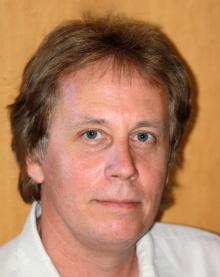
UC Santa Barbara and Burnham Institute for Medical Research Announce Director of New Joint Research Center for Nanomedicine
(La Jolla and Santa Barbara, Calif.) –– The Burnham Institute for Medical Research and the University of California, Santa Barbara have named leading biomedical researcher Jamey D. Marth director of a new joint Center for Nanomedicine that will be established at UCSB.
The collaborative biomedical research partnership merges UCSB's core expertise in engineering, materials sciences, nanotechnology, and physics with Burnham's strengths in the biological sciences and biomedical research.
The new center will promote the convergence of these fields and pioneer the development of novel technologies for advancing human health.
Together, UCSB and Burnham plan to recruit additional scientists to the Center for Nanomedicine to create collaborative research teams that will produce innovative technologies for an entirely new generation of biosensors, medical devices, drug delivery nanoparticles, instruments for advanced biomedical research, and other products.
Nanomedicine, an offshoot of nanotechnology, refers to highly specific medical intervention at the molecular scale for curing disease or repairing damaged tissues, such as bone, muscle, or nerve.
"Interdisciplinary nanotechnologies are vital to establishing a holistic and rigorous approach to biomedical research that encompasses disparate knowledge and integrates all of the cellular molecules and factors that contribute to disease," said Marth, who joined UCSB's faculty in the Department of Molecular, Cellular, and Developmental Biology (MCDB), as well as Burnham's faculty, on July 1.
At UCSB, Marth has been appointed to two prestigious endowed professorships. He is the first recipient of both the John Carbon Chair in Biochemistry and Molecular Biology and the Duncan and Suzanne Mellichamp Chair in Systems Biology in the campus's Biomolecular Science and Engineering Program.
Prior to joining Burnham and UCSB, Marth was professor of cellular and molecular medicine and Howard Hughes Medical Institute Investigator at the UC San Diego School of Medicine.
"With appointments to both UCSB and Burnham, I look forward to building further bridges between the talented scientists at these institutions and to promoting our joint efforts to develop nanotechnologies for disease diagnosis, prevention, therapy, and cure," said Marth. "This new and timely initiative will require the expertise of engineers, physicists, bioinformatics experts, and materials scientists working in close collaboration with biologists, that builds on the complementary expertise that exists at UCSB and the Burnham Institute for Medical Research."
Marth's laboratory is world-renowned in the application of cellular biology to uncovering the origins of disease. Marth is engaged in collaborative projects with UCSB and Burnham Institute scientists to develop nanotechnology platforms for biomedical research, including the means to rapidly detect and manipulate the cellular components that are responsible for health and disease.
His highly interdisciplinary research has led to the discovery of disease mechanisms that span multiple fields, including autoimmune disease, infectious disease, and dietary-induced Type 2 diabetes.
"We are pleased to welcome an elite scientist like Dr. Marth to Burnham and to this collaborative partnership with UCSB in the exciting field of nanomedicine," said Dr. John Reed, Burnham's president and chief executive officer, and professor and Donald Bren Presidential Chair at the institute. "The impact of our collaborative efforts will be far-reaching, not only in terms of advancing the science of nanomedicine, but in terms of economic development opportunities for new company generation and job creation."
Pierre Wiltzius, Worster Dean of Science and professor of physics at UCSB, noted that Marth will play a central role in shaping the future of biomedical research on campus and described him as a "truly stellar biomolecular scientists who merits these prestigious endowed chairs."
"The coupling of biomolecules to nanomaterials and their assembly into nanostructures will produce a wide range of ‘smart' devices with an enormous breadth of practical applications, including diagnostics and biosensors, drug screening and delivery, tissue engineering, and much more," Wiltzius added. "The impact of this new field of science, termed ‘nanomedicine,' on medicine and life sciences will be hugely transformative, comparable in magnitude to the transition from transistors to silicon chips in the computer sciences."
Larry Coldren, acting dean of UCSB's College of Engineering and Kavli Professor of Optoelectronics and Sensors, described the new center's collaborative opportunities in nanomedicine and systems biology as a "perfect complement" to research underway at UCSB on networked systems approaches to drug development and therapies.
"The combination of Jamey Marth's interests in disease mechanisms with our strengths in bioengineering and computational and materials sciences will be highly synergistic, and could well lead to major advances in therapies for grievous human diseases," he said.
Burnham established an affiliation with UCSB in 2006, led by internationally renowned biomedical researcher Erkki Ruoslahti, M.D., Ph.D.
Dr. Ruoslahti maintained his primary appointment as Distinguished Professor with Burnham and joined UCSB's Department of Molecular, Cellular, and Developmental Biology as an adjunct Distinguished Professor.
This type of collaboration, involving a highly ranked university and a nonprofit, independent research institute, exemplifies the inherent value of interdisciplinary research and the enhanced potential created when two such entities join forces.
"Professor Marth will invigorate interdisciplinary biomedical research at UC Santa Barbara, not only with his own exciting research in the Molecular, Cellular and Developmental Biology Department, but also with expansion of the Burnham Institute at UCSB," said Dennis O. Clegg, co-director of UCSB's Center for Stem Cell Biology and Engineering, and professor and recent past chair of MCDB. "Burnham is one the premier forces in medical research in the world, and expansion of the partnership with UCSB will enable novel approaches to uncover the molecular mechanisms of disease."
About the Carbon Chair and the Mellichamp Chair
Endowed chairs are highly prized academic positions established with philanthropic gifts. They enable a university to recruit and retain outstanding faculty and to develop more fully a field of study by providing chair holders with ongoing financial support for enhanced research and instruction.
The John Carbon Chair is named in honor of UCSB Emeritus Professor John Carbon, a pioneering biochemist who made numerous contributions to advance medical research.
Carbon served as one of the original scientific advisors to Amgen.
The chair was established by the Amgen Foundation, the William K. Bowes, Jr. Foundation, the Franklin and Catherine Johnson Foundation, and the Rathmann Family Foundation.
The Mellichamp Chair was created by Emeritus UCSB Chemical Engineering Professor Duncan Mellichamp and his wife, Suzanne, to support research in the emerging field of systems biology.
About Burnham Institute for Medical Research
Burnham Institute for Medical Research is dedicated to discovering the fundamental molecular causes of disease and devising the innovative therapies of tomorrow.
Burnham, with operations in California and Florida, is one of the fastest growing research institutes in the country. The institute ranks among the top four institutions nationally for NIH grant funding.
For the past decade (1999-2009), Burnham has ranked number one worldwide in the fields of biology and biochemistry for the impact of its research publications (defined by citations per publication), according to the Institute for Scientific Information. Burnham utilizes a unique, collaborative approach to medical research and has established major research programs in cancer, neurodegeneration, diabetes, and infectious, inflammatory, and childhood diseases. The institute is especially known for its world-class capabilities in stem cell research and drug discovery technologies.
About Engineering and the Sciences at UCSB
Engineering and the sciences at UC Santa Barbara are considered leaders in bioengineering, chemical and computational engineering, marine and environmental science, materials science, nanotechnology, and physics.
UCSB has five Nobel laureates on its faculty.
Related Links
Molecular, Cellular, and Developmental Biology
Burnham Institute for Medical Research



